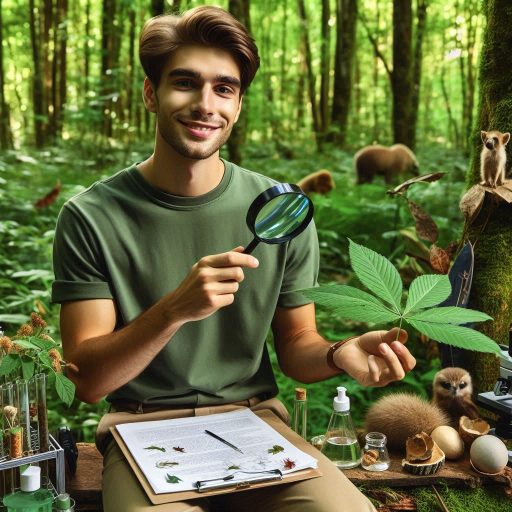Introduction
In ecology careers, fieldwork refers to collecting data directly from natural environments, such as forests or wetlands as fieldwork and lab work in ecology careers.
Ecologists observe species, record environmental conditions, and gather samples for further analysis.
On the other hand, lab work involves processing this data, running experiments, and analyzing results using specialized equipment.
Lab-based tasks range from examining soil samples to studying genetic material or chemical compositions.
Balancing fieldwork and lab work is essential in ecology careers.
Field observations offer real-world context, while lab analysis refines and interprets this data.
Ecologists who emphasize one over the other risk missing crucial insights.
Fieldwork provides raw, unfiltered information about ecosystems, but without lab work, this data remains incomplete.
Conversely, lab work alone lacks the depth of understanding gained from firsthand ecological experience.
Achieving a balance between these two aspects enhances the accuracy and scope of research.
It ensures a comprehensive approach to studying ecosystems and environmental challenges.
Ecologists who blend fieldwork and lab work create informed conservation strategies.
They influence policy decisions and drive meaningful change in the natural world.
Importance of Fieldwork
Gathering Firsthand Data and Observations in Natural Environments
Fieldwork is crucial for ecologists because it allows them to gather firsthand data in natural settings.
By immersing themselves in ecosystems, ecologists can observe species interactions, track environmental changes, and collect accurate measurements.
These observations often reveal nuances that lab work alone cannot provide.
Fieldwork provides the raw, unfiltered information essential for understanding ecosystems in their natural state.
Through firsthand data collection, ecologists contribute to more accurate and effective conservation strategies.
They also create a foundation of evidence that shapes environmental policies and management decisions.
Fieldwork encourages direct interaction with plants, animals, and habitats, which sharpens observational skills.
This process helps ecologists identify subtle patterns and changes that may go unnoticed in lab simulations.
Without this field experience, ecologists may lack the depth of understanding needed to tackle environmental challenges.
Field-based research also helps validate and refine hypotheses formed in the lab, ensuring that theories align with real-world scenarios.
The authenticity of data gathered in the field plays a key role in shaping ecological research and practice.
Building Connections with Nature and Ecosystems
Fieldwork allows ecologists to form deeper connections with the environments they study.
By spending time in nature, they gain a holistic understanding of ecosystems and their intricate dynamics.
These experiences foster a sense of responsibility toward preserving and protecting biodiversity.
Ecologists who spend time in the field develop a more intuitive grasp of the natural world‘s complexities.
They become more attuned to subtle environmental cues and patterns that can influence research outcomes.
Building connections with ecosystems also helps ecologists develop empathy for the species they study.
This empathy drives a stronger commitment to conservation and sustainable management practices.
Ecologists who conduct fieldwork directly witness habitat loss, climate change, and human activities.
This firsthand experience strengthens their advocacy for environmental protection.
By understanding ecosystems on a personal level, ecologists gain insights that can improve the effectiveness of conservation programs.
This deep connection with nature strengthens the ecologist‘s resolve to make meaningful environmental contributions.
Enhancing Critical Thinking and Problem-Solving Skills
Fieldwork presents ecologists with real-world challenges that enhance their critical thinking and problem-solving abilities.
Every field expedition involves adapting to unpredictable conditions, such as changing weather, terrain, or wildlife behavior.
These variables force ecologists to think on their feet and develop practical solutions to complex problems.
By facing these challenges head-on, they improve their ability to manage uncertainties in research and conservation efforts.
Fieldwork requires creative problem-solving, especially when standard equipment or methods fail.
Ecologists often have to innovate on the spot, finding ways to collect data despite unforeseen obstacles.
These experiences build resilience and foster adaptability, two essential traits for success in the field of ecology.
By learning to navigate unpredictable conditions, ecologists become more effective at designing experiments and managing projects in both field and lab settings.
This hands-on experience hones their ability to think critically and solve problems, skills that are invaluable in advancing ecological research and conservation efforts.
Importance of Lab Work
Lab work plays a crucial role in shaping ecology careers.
It provides controlled environments to validate findings and test theories.
While fieldwork collects raw data, lab work refines that data into usable insights.
Data Analysis and Interpretation
Ecologists gather massive amounts of data during fieldwork.
Analyzing this data in a lab helps identify meaningful patterns.
For example, lab-based data analysis can highlight relationships between species and environmental conditions.
Advanced software tools allow ecologists to sort, compare, and organize data efficiently.
Through careful analysis, ecologists can draw accurate conclusions about ecosystems.
Lab work also ensures that errors in field data are corrected.
Statistical tests help verify that observed trends are not due to chance.
Without lab analysis, field observations might remain raw and inconclusive.
Lab work gives ecologists the ability to turn these observations into reliable, actionable information.
Experimentation and Testing Hypotheses
Fieldwork may reveal possible ecological relationships, but hypotheses need testing in controlled settings.
Lab work allows ecologists to design and conduct experiments that test their theories.
By manipulating variables in the lab, researchers can better understand cause-and-effect relationships.
For example, to study the impact of temperature on plant growth, ecologists can control environmental factors in a lab setting.
These controlled experiments provide concrete evidence to support or refute hypotheses.
This process is essential for advancing ecological knowledge and confirming field observations.
Moreover, lab work enables ecologists to perform long-term experiments.
While conditions in the field constantly change, the lab offers stability for continuous observation.
This leads to more comprehensive results, giving ecologists a deeper understanding of ecological processes.
Collaborating with Other Scientists and Researchers
Ecology is inherently interdisciplinary.
Lab work brings together experts from various fields, fostering collaboration and innovation.
Ecologists often work with microbiologists, chemists, and physicists to solve complex environmental problems.
For instance, understanding water quality in aquatic ecosystems may require expertise in chemistry.
By working in labs, ecologists can directly collaborate with these specialists, leading to more accurate research outcomes.
Additionally, lab work promotes shared learning.
Researchers frequently share methods, tools, and techniques, improving overall research quality.
Collaborating in the lab creates opportunities to test new ideas and refine experimental designs.
This collaboration enhances the accuracy and reliability of ecological studies.
The lab environment also offers access to sophisticated equipment not available in the field.
Tools such as genetic sequencers or mass spectrometers allow for more detailed investigations.
These technological advantages lead to breakthroughs in understanding ecosystem dynamics.
Lab work is indispensable in ecology careers.
Through data analysis, experimentation, and collaboration, lab work turns raw observations into scientific discoveries.
Ecologists use lab environments to refine their field data, test hypotheses, and collaborate across disciplines.
This balance between lab and fieldwork deepens our understanding of the natural world.
Challenges of Balancing Fieldwork and Lab Work
Balancing fieldwork and lab work in ecology poses significant challenges.
Each aspect requires distinct skills and resources.
As ecologists navigate these responsibilities, they often encounter hurdles that can affect their research outcomes.
Here are three primary challenges faced when balancing fieldwork and lab work.
Time Management and Scheduling Conflicts
Time management is crucial for ecologists.
Fieldwork often demands significant blocks of time.
Weather conditions and seasonal variations can influence fieldwork schedules.
These factors may lead to unexpected delays.
Lab work, on the other hand, often has strict deadlines.
Analyzing samples requires careful planning and focus.
Scheduling conflicts can create stress and disrupt research timelines.
For example, an ecologist may plan a month-long field expedition.
During that time, they may also need to analyze data for another project.
This overlap complicates time management and prioritization.
To manage this, ecologists should develop clear schedules.
They can use project management tools to visualize their workload.
Setting milestones for both fieldwork and lab tasks helps maintain progress.
Regularly reassessing priorities can also reduce conflicts.
Balancing these responsibilities requires flexibility and proactive planning.
Ensuring Data Accuracy and Reliability
Data accuracy is essential in ecological research.
Fieldwork generates raw data that must undergo rigorous analysis in the lab.
Any errors in the field can lead to unreliable results.
This discrepancy can hinder the overall research quality.
Field conditions can complicate data collection.
Factors like weather, terrain, and time constraints can impact accuracy.
For instance, researchers may rush sample collection due to approaching storms.
This haste can lead to sampling errors or lost data.
In the lab, ensuring the integrity of data analysis is equally important.
Mistakes in handling samples can skew results.
Ecologists must follow protocols meticulously to avoid errors.
Implementing quality control measures during both field and lab work can enhance data reliability.
Creating a checklist for fieldwork can mitigate potential issues.
This checklist should include specific data collection methods and tools needed.
Conducting regular audits of lab procedures ensures adherence to established protocols.
These strategies help maintain the accuracy and reliability of data throughout the research process.
Managing Resources Effectively
Effective resource management is vital in ecology.
Fieldwork often requires various resources, including equipment, personnel, and finances.
Ecologists must balance these resources between field and lab work.
Limited funding can restrict fieldwork opportunities.
Researchers may need to prioritize projects based on available resources.
This prioritization can lead to difficult decisions about where to allocate funding.
Moreover, equipment used in fieldwork may also be needed in the lab.
Sharing equipment between locations can create logistical challenges.
To address this, ecologists should develop a resource allocation plan.
This plan should outline the required equipment, personnel, and budget for each project.
Regular communication with team members can facilitate resource management.
By discussing needs and limitations, teams can adapt their plans accordingly.
This collaborative approach can enhance efficiency and ensure the successful completion of both fieldwork and lab tasks.
Balancing fieldwork and lab work presents several challenges.
By focusing on time management, data accuracy, and resource management, ecologists can navigate these obstacles effectively.
Read: How to Become a Licensed Chemist in the USA: Steps and Tips
Strategies for Balancing Fieldwork and Lab Work
Balancing fieldwork and lab work in ecology can be challenging.
However, implementing effective strategies helps maintain productivity and focus.
Here are three key strategies to consider.
Creating a Detailed Work Plan and Schedule
A detailed work plan acts as a roadmap.
It outlines tasks and deadlines, ensuring you stay organized.
Start by identifying your objectives for both fieldwork and lab work.
Break down larger tasks into smaller, manageable steps.
This process makes it easier to track your progress.
Next, establish a realistic schedule.
Allocate specific time slots for fieldwork and lab work.
Be sure to account for travel time, data analysis, and report writing.
This structure prevents tasks from overlapping and minimizes stress.
Additionally, prioritize your tasks.
Determine which activities are most urgent and important.
Focus on completing high-priority tasks first.
This approach ensures that essential duties receive the attention they need.
Review your work plan regularly.
Adjust your schedule as needed based on progress and changing conditions.
This flexibility allows you to adapt to unexpected challenges in the field or lab.
Utilizing Technology for Remote Data Collection
Technology plays a vital role in modern ecology.
It facilitates efficient data collection and analysis.
Invest in tools that enable remote data collection.
For example, use mobile apps to record observations during fieldwork.
These apps often sync data to your computer, saving time later.
Drones can also aid in data collection.
They capture high-resolution images of study areas.
This technology reduces the need for repeated field visits.
Use these images for analysis in the lab.
Moreover, employ data management software.
This software organizes and stores data efficiently.
You can quickly access your data when transitioning between fieldwork and lab work.
Cloud storage solutions also provide convenient access from multiple devices.
Consider online collaboration tools.
Platforms like Google Drive or Dropbox facilitate easy sharing of data.
Collaborate with colleagues regardless of their location.
This collaboration fosters a more integrated approach to research.
Collaborating with Colleagues and Delegating Tasks
Collaboration enhances productivity in ecology.
Engaging with colleagues broadens your knowledge and skills.
Create a network of peers with complementary expertise.
This network can offer insights and support during fieldwork and lab work.
Delegating tasks is equally important.
Distributing responsibilities lightens your workload and empowers team members.
Assign specific tasks based on each person‘s strengths.
This strategy enhances efficiency and ensures tasks are completed effectively.
Regular communication is crucial for successful collaboration.
Schedule frequent meetings to discuss progress and share updates.
Use these sessions to brainstorm solutions to challenges.
Effective communication strengthens teamwork and fosters a positive work environment.
Celebrate team successes.
Acknowledging achievements boosts morale and motivates everyone.
This recognition encourages continued collaboration and teamwork.
Transform Your Career Today
Unlock a personalized career strategy that drives real results. Get tailored advice and a roadmap designed just for you.
Start NowBalancing fieldwork and lab work is essential for success in ecology careers.
By creating a detailed work plan, utilizing technology, and collaborating with colleagues, you can manage your workload effectively.
Implement these strategies to enhance your productivity and achieve your research goals.
Embrace the challenges and enjoy the rewarding journey in the field of ecology!
Read: Top Chemistry Departments and Schools in the US
Benefits of a Balanced Approach
Balancing fieldwork and lab work in ecology careers offers several advantages.
This equilibrium fosters a comprehensive understanding of ecological systems, increases research efficiency, and creates opportunities for interdisciplinary collaboration.
Comprehensive Understanding of Ecological Systems
A balanced approach allows ecologists to grasp the complexities of ecological systems.
Fieldwork offers firsthand experience with organisms in their natural habitats.
This direct observation enhances knowledge of species interactions and environmental factors.
It provides context for the data collected in the lab.
When ecologists conduct field studies, they encounter real-world challenges.
They observe behaviors, adaptations, and interactions that may not emerge in controlled settings.
These insights deepen their understanding of ecosystem dynamics.
They can connect theoretical concepts to practical applications.
By integrating field and lab experiences, ecologists develop a holistic view of ecosystems.
This comprehensive understanding supports effective decision-making.
Ecologists can propose solutions that consider the intricate relationships within ecosystems.
They can also predict how changes may impact these systems.
This foresight is crucial for conservation efforts and ecological management.
Increased Efficiency in Research Projects
Balancing fieldwork and lab work boosts efficiency in research projects.
Each component informs and enhances the other.
Field observations guide laboratory experiments, leading to more targeted research questions.
This synergy reduces time spent on irrelevant experiments.
For instance, if fieldwork reveals unexpected species interactions, ecologists can adapt their lab experiments.
They can design tests that explore these interactions further.
This adaptability streamlines the research process and maximizes resources.
Moreover, a balanced approach allows for simultaneous data collection and analysis.
Ecologists can collect samples during fieldwork while formulating hypotheses for lab analysis.
This integration accelerates the research timeline and leads to quicker results.
Efficiency also comes from sharing knowledge between field and lab teams.
Collaborations improve workflow and increase productivity.
Team members bring unique perspectives and expertise to the table.
This collective effort enhances the quality of the research and fosters innovation.
Opportunities for Interdisciplinary Collaboration
A balanced approach encourages interdisciplinary collaboration in ecology.
By combining fieldwork and lab work, ecologists connect with various scientific disciplines.
They often collaborate with biologists, chemists, and environmental scientists.
These partnerships broaden the scope of ecological research.
Interdisciplinary teams can tackle complex questions that single disciplines may not address.
For example, integrating molecular biology with field ecology enhances understanding of genetic diversity in populations.
This collaboration fosters innovative solutions to ecological challenges.
Additionally, interdisciplinary collaboration promotes knowledge exchange.
Ecologists gain insights from other fields, enriching their research.
They can apply techniques and methodologies from diverse disciplines to their studies.
This diversity of thought leads to creative problem-solving and novel approaches.
Moreover, interdisciplinary research often attracts more funding.
Funding agencies prioritize collaborative projects that address pressing environmental issues.
A balanced approach to field and lab work positions ecologists to secure these resources.
Balancing fieldwork and lab work yields numerous benefits.
It promotes a comprehensive understanding of ecological systems, increases research efficiency, and fosters interdisciplinary collaboration.
These advantages ultimately enhance the effectiveness of ecologists in their efforts to conserve and manage ecosystems.
Read: Earning Potential: Chemist Salaries Across US States

Real-life Examples of Successful Balancing
Ecologists face unique challenges when balancing fieldwork and lab work.
Learning from the experiences of others can provide valuable insights.
Here are six case studies showcasing successful strategies.
Case Study 1: Dr. Jane Thompson ‘ Marine Ecologist
Dr. Jane Thompson studies coral reefs.
She spends two months in the field and two months in the lab each year.
During her field trips, she collects samples and data on reef health.
Back in the lab, she analyzes these samples and runs experiments.
Dr. Thompson emphasizes time management.
She blocks her calendar for both field and lab work.
This approach keeps her focused and reduces distractions.
Case Study 2: Dr. Marcus Lee ‘ Terrestrial Ecologist
Dr. Marcus Lee researches plant ecology in temperate forests.
He divides his year into specific seasons for fieldwork and lab analysis.
In spring, he focuses on collecting plant samples.
In winter, he processes samples and writes reports.
This seasonal balance allows Dr. Lee to optimize his productivity.
He shares that clear goals for each phase are crucial for success.
Case Study 3: Dr. Maria Gonzalez ‘ Conservation Biologist
Dr. Maria Gonzalez works on wildlife conservation projects.
She splits her time equally between fieldwork and lab analysis.
Her fieldwork includes tracking animal populations and habitats.
In the lab, she analyzes data and collaborates with conservation teams.
Dr. Gonzalez emphasizes collaboration.
She encourages regular communication with her colleagues.
This practice enhances team dynamics and improves overall efficiency.
Case Study 4: Dr. David Nguyen ‘ Aquatic Ecologist
Dr. David Nguyen specializes in freshwater ecosystems.
He uses a unique approach to balance his work.
He schedules short, intensive field trips throughout the year.
During these trips, he collects data on water quality and aquatic life.
He then returns to the lab for in-depth analysis.
Dr. Nguyen highlights flexibility as a key factor.
Adapting his schedule based on project needs helps maintain balance.
Case Study 5: Dr. Lisa Patel ‘ Soil Scientist
Dr. Lisa Patel studies soil health and its impact on ecosystems.
She employs a mixed-methods approach.
Her fieldwork involves soil sampling and ecosystem assessments.
In the lab, she focuses on chemical analyses and data modeling.
Dr. Patel believes in the power of technology.
She uses digital tools to streamline data collection and analysis.
This efficiency frees up more time for both types of work.
Case Study 6: Dr. Kevin Brown ‘ Climate Ecologist
Dr. Kevin Brown researches climate change impacts on ecosystems.
He spends half the year in the field collecting data.
The other half, he focuses on data analysis and publication.
Dr. Brown finds that setting deadlines for lab work boosts productivity.
He also shares his findings in conferences, allowing for constructive feedback.
This strategy helps him refine his research and achieve his goals.
These case studies illustrate the successful balance between fieldwork and lab work in ecology.
Each ecologist employs unique strategies to manage their time and enhance productivity.
Their experiences offer valuable lessons and best practices for aspiring ecologists.
Adapting these approaches can lead to a fulfilling and productive career in ecology.
Read: Key Roles and Responsibilities of a Chemist in the US
Professional Development Opportunities
Balancing fieldwork and lab work in ecology requires continuous professional development.
Attending workshops and training programs can enhance your skills.
These opportunities allow ecologists to learn advanced field techniques and lab methodologies.
Workshops and Training Programs
Participating in specialized workshops offers hands-on experiences.
Ecologists can practice new methods, such as data collection and species identification.
Workshops often cover essential lab techniques, including sample preparation and analysis.
Training programs may also focus on the latest technologies.
For example, remote sensing and GIS workshops teach effective data visualization.
Ecologists who engage in these programs stay updated on industry trends.
They develop a competitive edge, which is crucial in this evolving field.
Many universities and research institutions host workshops.
These events often feature experienced practitioners.
They provide invaluable insights into balancing fieldwork and lab work.
Participants gain practical knowledge they can apply in their careers.
Networking Events with Experts
Networking is vital for professional growth.
Engaging with experts in the field opens doors to new opportunities.
Attend conferences, seminars, and ecological society meetings to meet professionals.
These events foster connections with like-minded individuals.
Building relationships can lead to collaborations and mentorships.
Learning from established ecologists enhances your understanding of the field.
Networking also provides insights into potential job openings.
Many opportunities arise from personal connections rather than job postings.
A strong network can be an essential asset throughout your career.
Continued Education Initiatives to Enhance Skills
Continued education is essential for staying relevant in ecology.
Online courses and certifications offer flexibility for busy professionals.
Many institutions provide options tailored to working ecologists.
These programs often focus on specific topics.
You can deepen your knowledge in areas like conservation biology, population dynamics, or climate science.
Specialized education boosts your expertise, making you more valuable in your field.
Research initiatives also support continued education.
Participating in collaborative research projects enhances practical experience.
These initiatives encourage ecologists to apply their skills in real-world settings.
Additionally, staying engaged in research keeps your knowledge current.
It ensures you remain competitive in the job market.
Engaging in research also opens up opportunities for publishing and presenting findings.
Transform Your Career Today
Unlock a personalized career strategy that drives real results. Get tailored advice and a roadmap designed just for you.
Start NowBalancing fieldwork and lab work requires ongoing learning.
Workshops, networking, and continued education are critical components of professional development.
They provide valuable resources for enhancing your skills and knowledge.
Investing in professional development strengthens your career in ecology.
By taking advantage of these opportunities, you prepare yourself for future challenges.
Building a solid foundation in both field and lab work is essential.
As you develop your skills, seek feedback from peers and mentors.
Continuous improvement helps you stay adaptable in a changing environment.
Focus on areas that need growth, and remain open to new ideas.
Actively pursuing professional development opportunities leads to success.
Workshops, networking events, and continued education initiatives can significantly impact your career.
Embrace these opportunities to ensure a fulfilling and dynamic career in ecology.
Discover More: Grants and Funding Opportunities for Zoologist Projects
Conclusion
Balancing fieldwork and lab work is crucial for success in ecology careers.
Each component provides unique insights that enhance overall understanding.
Fieldwork allows ecologists to gather first-hand data in natural environments.
This experience often leads to questions and hypotheses that require lab analysis.
Conversely, lab work helps in testing these hypotheses rigorously.
A holistic approach to research integrates both aspects seamlessly.
It enables ecologists to interpret data accurately and draw meaningful conclusions.
By balancing these elements, researchers can address ecological issues more effectively.
This integration fosters innovative solutions to complex environmental challenges.
Moreover, this dual focus enhances professional development and skill acquisition.
Fieldwork sharpens observational and practical skills, while lab work cultivates analytical thinking and problem-solving abilities.
Together, they create a well-rounded ecologist capable of tackling diverse issues.
Embracing both field and lab work enriches the research experience.
This balance not only contributes to personal growth but also advances ecological knowledge.
As ecological challenges grow, a comprehensive approach becomes even more essential for impactful research.




